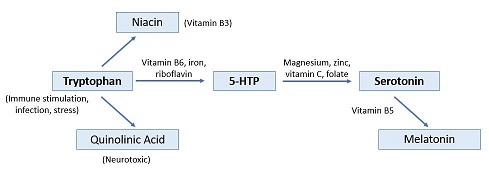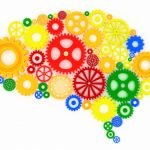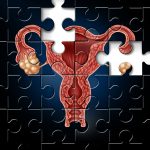Defeating Depression: A Holistic Approach
CHRISTINA BJORNDAL, ND
SYDNEY SPEER
Now, more than ever, our society is being affected by continually rising rates of mental illness. Depression is the leading cause of disability in the United States for people ages 15-44, affecting more than 16 million American adults, and results in more than 48 000 suicides per year.1,2 Effective treatment of depression requires a multi-faceted approach that addresses underlying causes and supports the whole person.
The first level of health to address relates to one’s physiology, thus requiring an understanding of the biochemical pathways that affect neurotransmitter formation. The physical system can be divided into 3 macrosystems: neurotransmitters, neuroendocrine system (hormones), and the organs of detoxification/immunity. One of the major pathways utilized in depression treatment is the serotonin pathway. First-line pharmacology treatment, which includes selective serotonin-reuptake inhibitors (SSRIs), targets this pathway. It is helpful to also target it from a naturopathic approach.
Physical health is closely linked to emotional health, and dysfunction within the physical being is often the root cause of mental illness. Physical health is connected to emotional health through the gut-brain axis, inflammation, poor digestion, decreased neurotransmitter production, increased quinolinic acid production, hormone imbalances (cortisol, estrogen, progesterone, etc), decreased detoxification/liver health, poor memory consolidation, increased amygdala activity, fear-based reasoning, and environmental exposures, including heavy metals, mold, and infectious agents (eg, viruses, bacteria [Lyme disease]). Identifying the root cause can help improve depression outcomes.
Nutrition for Depression
The building blocks of mental health lie within nutrition. This is because what we put in our bodies has a direct impact on the neurotransmitters and hormones that are needed to regulate our behavior and mood. One of the main pathways that must be attended to is the tryptophan/serotonin pathway.

Foods to Eat
In general, a diet for depression should be high in raw fruits and vegetables, whole grains, raw nuts and seeds, and legumes. Such a diet will ensure adequate amounts of amino acids, essential fatty acids, and complex carbohydrates to increase serotonin levels in the brain.3 There are also 3 nutrients, in particular, that can provide support for depression.
The first is tryptophan, which is a precursor to serotonin. It is an essential amino acid, meaning that our bodies do not produce it, so it must be provided through diet or supplementation. Tryptophan-rich foods should be emphasized, such as turkey, tuna, salmon (wild), cashews, halibut, shrimp, oatmeal flakes, pork, avocado, cottage cheese, wheat germ, eggs, collards, spinach, raisins, yogurt, chicken, and sweet potato.4
Vitamin B6-rich foods should also be increased, as vitamin B6 is a cofactor needed for the conversion of tryptophan to 5-hydroxytryptophan (5-HTP). Foods high in B6 include watermelon, bananas, avocado, chicken, turkey, rainbow trout, sunflower seeds, halibut, sweet potato, potato, tuna, broccoli, brown rice, walnuts, oat bran, 100% bran cereal, feta cheese, salmon, beans, and millet.5
Increasing dietary intake of essential fatty acids, specifically omega-3s, can also be helpful for depression. Foods high in omega-3s include cold-water fish, walnuts, flax and chia seeds, fish oil, vegetable oils (walnut, safflower, sunflower), flaxseed oil, and black currant seed oil.6,7
It is also important to ensure that the liver is working effectively to detoxify different hormones, neurotransmitters, and environmental chemicals. Foods that support liver detoxification include beets, cauliflower, cabbage, broccoli, kale, Brussels sprouts, carrots, artichokes, lemons, parsnips, dandelion greens, watercress, and burdock root.
Foods to Avoid
When treating depression, the main emphasis should be on the supportive foundation foods mentioned above. However, it is still important to encourage patients to reduce or eliminate foods that adversely affect mental health, such as alcohol, caffeine (including coffee and black tea), processed foods, and foods high in saturated fat. It is also important to avoid foods containing aspartame or other artificial sweeteners, which can block the formation of serotonin and cause headaches, insomnia, and depression in individuals who are already serotonin deprived.8
High sugar intake significantly increases the risk of mental illness.9 Patients with depression should ideally be consuming less than 36 grams of sugar a day.10 My goal is for patients to eat as little sugar as possible; however, I also want to be realistic with patients, not idealistic. It is helpful to teach patients how to read labels and to visualize 1 tsp for every 4 grams of sugar.
Wheat often appears to be a problem for those with depression. Although the exact mechanism is not known, some theories involve the spraying of wheat with glyphosate and specific proteins in wheat, such as gliadin and gluten.11
Foods such as wheat and sugar can contribute to food intolerances and leaky gut.11,12 It is also helpful to identify any additional food allergies and sensitivities through food sensitivity testing.
Supplementation for Depression
Supplementation is often necessary for people who are struggling with depression. Using the correct dose, form, and route of administration, as well as avoiding the use of nutraceutical and pharmaceutical products containing problematic, non-medicinal ingredients, is imperative for efficacious supplementation. Initially, it may be necessary to start with higher doses to initiate the healing process and then to taper down so that the minimum dose is being used for the maximum benefit.
Supplementing the cofactors for serotonin biosynthesis should be the main focus of supplementation.
Vitamin B3: Tryptophan, the precursor to serotonin, can follow several different biochemical pathways to make different substances. The most preferential substance made from tryptophan is niacin, which is used by every cell to make adenosine triphosphate (ATP). When the body does not have enough vitamin B3, tryptophan is diverted away from the serotonin pathway and toward the niacin pathway.13 Vitamin B3 is available in 3 forms: niacin (nicotinic acid), niacinamide (nicotinamide), and inositol hexanicotinate.14 Niacinamide is the preferred form for mental health support, as inositol hexanicotinate has not been found to be effective for depression, and niacin often gives an uncomfortable flushing reaction and requires monitoring of liver enzymes if used over a long period of time.
Vitamin B6 is a cofactor in the conversion of tryptophan to 5-HTP. The best-utilized form for anxiety and depression is the active form of B6, pyridoxal 5’-phosphate (P5P).
Folate is needed in the final step of serotonin production, and is best supplemented in its active form, 5-methyltetrahydrofolate (5-MTHF).15
Vitamin B12 is available in 3 forms; methylcobalamin, hydroxocobalamin, and cyanocobalamin. The most easily absorbed form of B12 is methylcobalamin.
Zinc is best utilized in the zinc citrate or picolinate forms.
Vitamin C is needed for the conversion of 5-HTP to serotonin and is also an essential nutrient.
Magnesium comes in many different forms. Magnesium bisglycinate is the best form for mental health because of glycine’s calming properties. However, for patients with constipation, for example, I may use magnesium citrate.
Omega 3s can be separated into 2 groups: EPA (eicosapentaenoic acid) and DHA (docosahexaenoic acid). The ratio of n-3s to n-6s has an impact on mood.16 For the best results with depression and anxiety, I aim for an EPA:DHA ratio of either 2:1 or 3:1.
Iron should ideally be delivered in the iron bisglycinate form, given its glycine component and the fact that it’s non-constipating.
Vitamin B2 (Riboflavin) and Vitamin B5 (Pantothenic acid) are also important cofactors in the synthesis of serotonin.
Depression: More Than a Physical Disorder
In addition to evaluating biochemical contributors to depression, it is also essential to explore the mental, emotional, and spiritual aspects of an individual.
A key priority in addressing the mental aspect is to teach patients how to manage their mind, so that they are not at the mercy of it. Most people can get stuck in a thought-rut whereby their thoughts trigger an emotion, then this emotion triggers another thought, which in turn triggers another emotion, and so on. Often these thoughts lead us into a pit of depression. I refer to this cycle as the thought-emotion cycle. Breaking this cycle of problematic thoughts is key to improving a patient’s mental health.
One way to teach patients how to break this cycle is by explaining psychoneuroimmunology and helping them understand the potential biochemical impact of their thoughts on their physiology. The framework I use with them is called the “5 Rs,” adapted from the 4 Rs that I learned from Dr Jason Hughes:
- Recognize your thoughts.
- Refrain from following your thoughts by…
- Relaxing into the breath.
- Resolve to repeat steps 1-3 and 5.
- Rephrase/Reaffirm the thought you recognized into either a positive or neutral statement.
A holistic approach to depression requires treating the person instead of their symptoms, and addressing their physical, mental, emotional, and spiritual being. Working with the following 10 fundamentals of health can lead to greatly improved mental health in your patients:
- diet/nutrients
- sleep
- exercise
- managing stress
- thoughts
- emotions
- behaviors and reactions
- environment, including chemicals, epigenetics, and neuroplasticity
- spirituality
- love and compassion for oneself
Case Study
LH, a 28-year-old female, presented to the clinic with anxiety, depression, sleep dysfunction, premenstrual syndrome (PMS), and a history of an eating disorder. Current supplements and medications included 25 mg of sertraline and 400 mg of magnesium malate/citrate for muscle pain.
Mental health monitoring forms from Dr Christine Padesky’s book Mind Over Mood17 were completed, resulting in a score of 42/72 for anxiety, and a score of 45/57 for depression.
Treatment
Initial treatment recommendations focused on increasing important nutrients through diet and supplementation, addressing sleep and exercise, and changing thought patterns:
- Niacinamide: 2 caps at breakfast
- Multi-B6: 1 cap at breakfast
- Magnesium bisglycinate: 2 caps at bedtime for anxiety, sleep, and depression
- Sleep hygiene suggestions
- Exercise: Daily movement that you enjoy
- Diet: Eat tryptophan-rich foods daily; eat protein at breakfast and lunch to balance blood sugar; increase water intake to half of your body weight in ounces, plus drink 2 cups of water for every cup of coffee consumed
- Seed cycling protocol for menstrual cycle and hormonal health to help reduce PMS18
- Daily gratitude journaling
- Do something you love to do every day
- Spend a few minutes each day imagining yourself as energetic, healthy, etc
- Identify any suicidal thoughts as problematic, and view these thoughts as red flags that in that moment you are not loving yourself. Shift to kindness.
The following blood tests were also ordered: CBC + Differential; Cholesterol panel (HDL, LDL, Triglycerides); Fasting glucose; Liver enzymes (ALT, ALP, GGT); Bilirubin; Ferritin; TSH; anti-TPO antibodies; Vitamin B12; Cortisol (AM); Estradiol; Progesterone (to be tested between Days 18 and 22 of her menstrual cycle, with Day 1 being the first day of flow).
One-Month Follow-up
At her second visit, LH reported that her stress and anxiety did not worsen upon learning that her partner lost his job; this response was unusual. Her sleep had improved, and she reported increased energy in the mornings. The same mental health-monitoring forms as used initially showed slight improvements for anxiety and depression, with scores of 39/72 and 40/57, respectively.
Treatment recommendations in this appointment were based on lab results and teaching the 5Rs. Blood work results showed suboptimal vitamin B12 levels, low progesterone, and suboptimal cortisol.
The initial protocol was continued with the addition of the following:
- Methylcobalamin: 2000 µg in the morning
- Herbal tincture including Hypericum perforatum, Avena sativa, and Passiflora incarnata, dosed at 2 tsp/day in the morning with water, 10 minutes away from food
- Vitamin D: 5000 IU once per day with food
- Evening primrose oil: 2 g twice daily on Days 15 to Day 1 of her next cycle for progesterone support
- Magnesium malate/citrate: 400 mg daily for muscle pain; increase to 400 mg twice daily on Days 33 to 35 for menstrual cramps
- Practice the 5 Rs of working with problematic thoughts
Two-, 3- and 4-Month Follow-ups
Treatment during the subsequent 3 visits focused on counseling.
At LH’s 2-month follow-up, there were noticeable improvements in her mental health scores: 25/72 and 17/57 for anxiety and depression, respectively. The patient also reported no cramps or PMS symptoms during her cycle.
At the 3-month follow up, LH reported stable mood despite the significant stress of having a close friend attempt suicide.
By 4 months, the LH reported being anxiety- and depression-free, which was also evidenced by a score of 14/72 for anxiety, and a score of 17/57 for depression.
Addressing depression using a holistic, multi-modal approach can lead to significant improvements in mental well-being, which have lasting outcomes in many patients’ lives.19
References:
- Anxiety and Depression Association of America. Facts & Statistics. ADAA Web site. https://adaa.org/about-adaa/press-room/facts-statistics. Accessed November 15, 2020.
- National Institute of Mental Health. Suicide. Last updated September 2020. NIMH Web site. https://www.nimh.nih.gov/health/statistics/suicide.shtml. Accessed November 15, 2020.
- Wurtman RJ, Wurtman JJ. Brain serotonin, carbohydrate-craving, obesity and depression. Obes Res. 1995;3 Suppl 4:477S-480S.
- Whitbread D. Top 10 Foods Highest in Tryptophan. Last updated December 9, 2020. Available at:https://www.myfooddata.com/articles/high-tryptophan-foods.php. Accessed November 30, 2020.
- Whitbread D. Top 10 Foods Highest in Vitamin B6. Last updated December 9, 2020. Available at: https://www.myfooddata.com/articles/foods-high-in-vitamin-B6.php. Accessed November 30, 2020.
- Whitbread D. Top 10 Foods Highest in Omega 3 Fatty Acids. Last updated December 9, 2020. Available at: https://www.myfooddata.com/articles/high-omega-3-foods.php. Accessed November 30, 2020.
- Orthomolecular.org. Fats and Oils. Available at: http://orthomolecular.org/nutrients/fats.shtml. Accessed November 30, 2020.
- Choudhary AK, Lee YY. Neurophysiological symptoms and aspartame: What is the connection? Nutr Neurosci. 2018;21(5):306-316.
- Knüppel A, Shipley MJ, Llewellyn CH, Brunner EJ. Sugar intake from sweet food and beverages, common mental disorder and depression: prospective findings from the Whitehall II study. Sci Rep. 2017;7(1):6287.
- CBC News. The Secrets of Sugar – the fifth estate. October 3, 2014. [YouTube video]. Available at: https://www.youtube.com/watch?v=K3ksKkCOgTw. Accessed November 30, 2020.
- Samsel A, Seneff S. Glyphosate, pathways to modern diseases II: Celiac sprue and gluten intolerance. Interdiscip Toxicol. 2013;6(4):159-184.
- Rinninella E, Cintoni M, Raoul P, et al. Food Components and Dietary Habits: Keys for a Healthy Gut Microbiota Composition. Nutrients. 2019;11(10):2393.
- Badawy AA. Tryptophan Metabolism: A Versatile Area Providing Multiple Targets for Pharmacological Intervention. Egypt J Basic Clin Pharmacol. 2019;9:10.32527/2019/101415.
- MacKay D, Hathcock J, Guarneri E. Niacin: chemical forms, bioavailability, and health effects. Nutr Rev. 2012;70(6):357-366.
- Taylor MJ, Carney S, Geddes J, Goodwin G. Folate for depressive disorders. Cochrane Database Syst Rev. 2003;2003(2):CD003390.
- Simopoulos AP. Omega-3 fatty acids in inflammation and autoimmune diseases. J Am Coll Nutr. 2002;21(6):495-505.
- Greenberger D, Padesky C. Mind over Mood. New York, NY: The Guilford Press; 1995.
- Nourished by Nutrition. Seed Cycling for Hormone Balance. December 2020. Available at: https://nourishedbynutrition.com/seed-cycling-for-hormone-balance/. Accessed January 2, 2021.
- Bjorndal C. Beyond the Label: 10 Steps to Improve your Mental Health with Naturopathic Medicine. Edmonton, AB: Natural Terrain Inc; 2017.

Christina Bjorndal, ND is an authority in the treatment of mental illnesses such as depression, anxiety, bipolar disorder, and eating disorders. Dr Chris is a gifted speaker and writer who loves to share her philosophy of wellness in interviews with icons like Jenny McCarthy and many more. Two independent organizations have recognized her as one of the top NDs. Dr Chris has helped many patients achieve physical, mental, emotional, and spiritual well-being. She is a best-selling author, has written 4 books on mental health, and has created 2 courses: 1) a 10-week course for individuals; and 2) a Clinician’s Integrative Mental Health 10-week course.

Sydney Speer is a 4th-year naturopathic medical intern studying at the Canadian College of Naturopathic Medicine. She is passionate about working with the pediatric population and teaching the foundations of physical, mental, and emotional health from an early age. Sydney loves spending time in nature, hiking, biking, and skiing.










